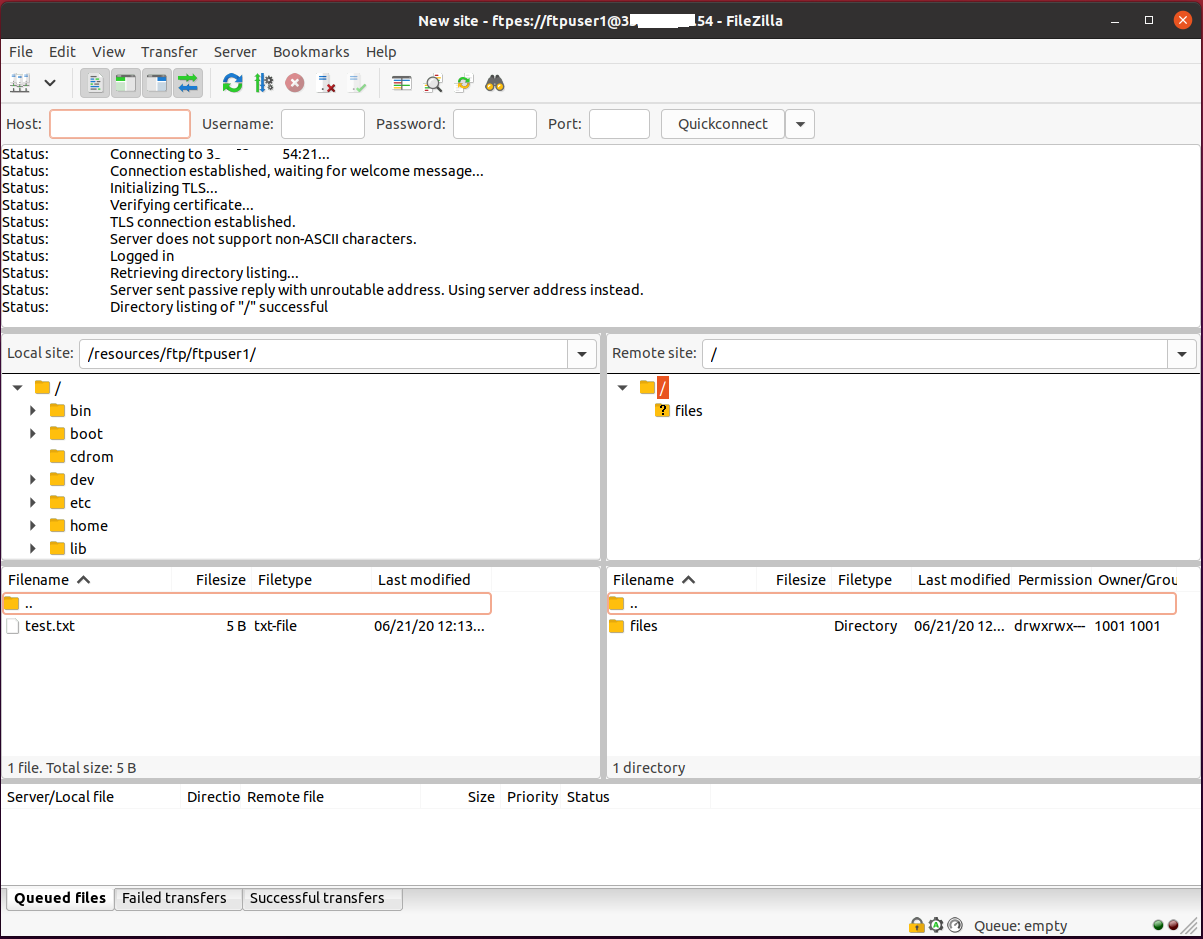FileZilla is a free and cross-platform FTP client widely used to communicate with the FTP servers to upload and download files. FileZilla consists of both Client and Server applications. The client application is available for Windows, Linux, and macOS. This tutorial provides the steps required to install the FileZilla client application on Ubuntu 20.04 LTS. The steps should be the same on other versions of Ubuntu and Linux systems.
Install FileZilla - Command Line
This section provides the steps to install FileZilla client on Ubuntu using the APT Package Manager. Now execute the command as shown below to install the FileZilla client from the Ubuntu repositories.
# Refresh Packages Index sudo apt update
# Install FileZilla sudo apt install filezilla
# Output Reading package lists... Done Building dependency tree Reading state information... Done The following additional packages will be installed: filezilla-common libfilezilla0 libpugixml1v5 libwxbase3.0-0v5 libwxgtk3.0-gtk3-0v5
The following NEW packages will be installed: filezilla filezilla-common libfilezilla0 libpugixml1v5 libwxbase3.0-0v5 libwxgtk3.0-gtk3-0v5 ---- ---- Unpacking filezilla (3.46.3-1build1) ... Setting up libfilezilla0 (0.19.3-1build1) ... Setting up libpugixml1v5:amd64 (1.10-1) ... Setting up filezilla-common (3.46.3-1build1) ... Setting up libwxbase3.0-0v5:amd64 (3.0.4+dfsg-15build1) ... Setting up libwxgtk3.0-gtk3-0v5:amd64 (3.0.4+dfsg-15build1) ... Setting up filezilla (3.46.3-1build1) ... Processing triggers for mime-support (3.64ubuntu1) ... Processing triggers for hicolor-icon-theme (0.17-2) ... Processing triggers for gnome-menus (3.36.0-1ubuntu1) ... Processing triggers for libc-bin (2.31-0ubuntu9) ... Processing triggers for man-db (2.9.1-1) ... Processing triggers for desktop-file-utils (0.24-1ubuntu2) ...
This completes the installation of FileZilla on Ubuntu. Now execute FileZilla from the command line as shown below.
# Start FileZilla filezilla
We can also start FileZilla from the Applications Panel. Click the Applications Icon at the bottom right corner of Desktop. It will show the list of applications installed on the system as shown in Fig 1.

Fig 1
Click the FileZilla application launcher as highlighted in Fig 1. It will start FileZilla FTP client and shows the Welcome Dialog as shown in Fig 2.

Fig 2
Now click the OK Button to close the Welcome Dialog.
Uninstall FileZilla - Command Line
This section provides the steps to remove or uninstall FileZilla from Ubuntu. We can execute either of the commands as shown below to remove FileZilla from Ubuntu.
# Uninstall or remove FileZilla sudo apt remove filezilla
# Output Reading package lists... Done Building dependency tree Reading state information... Done The following packages were automatically installed and are no longer required: filezilla-common libfilezilla0 libpugixml1v5 libwxbase3.0-0v5 libwxgtk3.0-gtk3-0v5 Use 'sudo apt autoremove' to remove them. The following packages will be REMOVED: filezilla ---- ---- Removing filezilla (3.46.3-1build1) ... Processing triggers for mime-support (3.64ubuntu1) ... Processing triggers for gnome-menus (3.36.0-1ubuntu1) ... Processing triggers for man-db (2.9.1-1) ... Processing triggers for desktop-file-utils (0.24-1ubuntu2) ...
# Remove dependent packages sudo apt autoremove sudo apt autoclean
The above-mentioned commands uninstall FileZilla without removing the configuration files. We can purge FileZilla to completely remove it with the configuration file as shown below.
# Completely remove FileZilla sudo apt purge filezilla
# Output Reading package lists... Done Building dependency tree Reading state information... Done The following packages were automatically installed and are no longer required: filezilla-common libfilezilla0 libpugixml1v5 libwxbase3.0-0v5 libwxgtk3.0-gtk3-0v5 ---- ---- Removing filezilla (3.46.3-1build1) ... Processing triggers for mime-support (3.64ubuntu1) ... Processing triggers for gnome-menus (3.36.0-1ubuntu1) ... Processing triggers for man-db (2.9.1-1) ... Processing triggers for desktop-file-utils (0.24-1ubuntu2) ...
# Remove dependent packages sudo apt autoremove sudo apt autoclean
Install FileZilla - Ubuntu Software
This section provides the steps to install FileZilla using the Ubuntu Software application. Now click the Applications Icon at the bottom right corner of Desktop as shown in Fig 3.

Fig 3
Also, click the Ubuntu Software application launcher as highlighted in Fig 3. It will open the Ubuntu Software application. Now search for FileZilla as shown in Fig 4.

Fig 4
Click the FileZilla option as highlighted in Fig 4. It will open the Application Panel and shows the details with the installation option as shown in Fig 5.

Fig 5
Now click the Install Button to start installing FileZilla on Ubuntu. It will ask to authenticate the installer as shown in Fig 6 and show the installation progress as shown in Fig 7.

Fig 6

Fig 7
After completing the installation, the application panel shows the options to uninstall or remove FileZilla as shown in Fig 8.

Fig 8
Now close the installer to complete the installation. This completes the installation of FileZilla on Ubuntu 20.04 LTS using the Ubuntu Software application. Also, follow Fig 1 and Fig 2 to launch FileZilla.
Connect With FTP Server - Quickconnect
This section provides the steps to quick connect to the FTP server using FileZilla FTP client. Now fill the server details as shown in Fig 9.

Fig 9
Click the Quickconnect Button after filling the Host, Username, Password, and Port. It will ask to remember passwords using the Remember Passwords Dialog as shown in Fig 10.

Fig 10
Choose the appropriate option to remember the passwords and click the OK Button. In case the server is communicating over an insecure protocol, it will also show the security warning as shown in Fig 11. The remote server must always be configured to use FTP over TLS to securely transfer files between the local system and remote server. The clear password and files must not be transferred over an insecure connection for production usage.

Fig 11
Click the OK button for testing purposes. It will successfully connect with the server and list the directories and files available at the root directory of the FTP user as shown in Fig 12.

Fig 12
Now transfer file by simply double-clicking it or right-click and choose Upload Option as shown in Fig 13.

Fig 13
FileZilla shows the 533 error in case write permission is not provided by the server. Now open the files directory having read and write permissions as shown in Fig 14.

Fig 14
If we try to transfer the file to the directory having appropriate permissions, it will transfer over the FTP protocol as shown in Fig 14. These are the easy steps to transfer files between the local system and remote system/server over the FTP protocol.
Connect With FTP Server - FTP over TLS
This section provides the steps to securely connect to the FTP server using the Site Manager of FileZilla. Now open the Site Manager by clicking File -> Site Manager. It will open the Site Manager as shown in Fig 15.

Fig 15
Click the New Site Button to create and configure a site as shown in Fig 16.

Fig 16
Now click the Connect Button to connect with the FTP server. It might show an SSL certificate warning in case of self-signed certificates as shown in Fig 17.

Fig 17
Click OK Button to accept the self-signed SSL certificate. FileZilla must connect to the FTP server using TLS as shown in Fig 18.

Fig 18
This is safer than communicating with the FTP server in clear.
Summary
This tutorial provided the steps required to install the FileZilla FTP client on Ubuntu 20.04 LTS and also showed how to connect with the FTP Server using SSL/TLS encryption.

